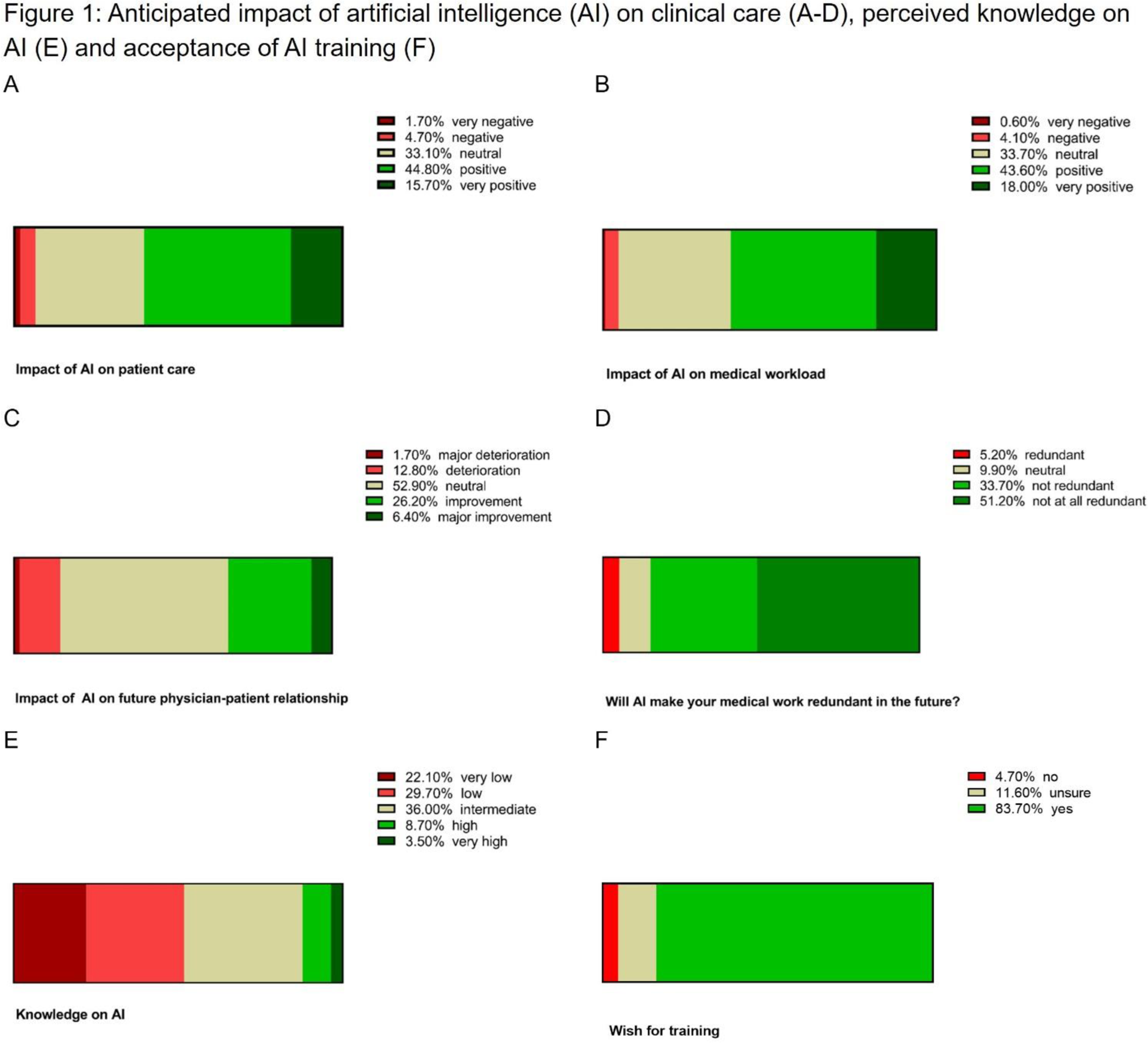

Background: Artificial intelligence (AI) is revolutionizing all medical disciplines, including rheumatology. It is unclear to what extent AI is already used in rheumatology in clinical routine. Additionally, the perceived barriers, potentials, and expectations regarding AI by rheumatologists have not yet been studied.
Objectives: The study investigates the current usage and perception of AI among German rheumatologists.
Methods: A web-based survey was designed by the Working Group Young Rheumatology of the German Society for Rheumatology. The prospective survey with 17 questions regarding previous usage, barriers, potentials, and expectations was distributed at the Congress of the German Society for Rheumatology, as well as via email, social media and QR Code from August 30th through November 4th, 2023.
Results: Of the 172 participating rheumatologists, the majority had not yet used AI (126/172, 73 %) in their clinical routine. AI knowledge was rated as very low to intermediate by 88% (151/172), and 84% (144/172) would appreciate dedicated AI training. Rheumatologists consider AI helpful for diagnostics (125/172, 73%), writing medical reports (121/172, 70%), data analysis (120/172, 70%), or documentation (119/172, 69%). Most rheumatologists (141/172, 82%) preferred a transparent AI-based diagnostic decision support compared to an AI-based diagnostic decision support with improved diagnostic accuracy but with a non-transparent decision algorithm. A positive influence of AI on patient care (104/172, 60%) as well as on reduction of daily workload (106/172, 62%) was anticipated. Most rheumatologists (146/172, 85%) did not think AI could make their medical work redundant (Figure 1A–F). Barriers mentioned by the rheumatologists included the final responsibility for AI-based decisions (110/172, 64%) as well as data security (99/172, 58%).
Conclusion: To the best of our knowledge, this is the first study to examine current use by rheumatologists and their perceptions of AI. While increased use of AI in clinical practice was welcomed, current AI use and knowledge were low. This suggests that dedicated AI training for rheumatologists is needed.
REFERENCES: NIL.

Acknowledgements: We would like to thank all participants as well as all members of the Working Group Young Rheumatology. MTH and AM share first authorship. JK and MK share last authorship.
Disclosure of Interests: Marie-Therese Holzer Boehringer-Ingelheim, Anna Meinecke: None declared, Felix Mueller: None declared, Isabell Haase Abbvie, AstraZeneca, Boehringer Ingelheim, Galapagos, GSK, Janssen, Lilly, Medac, Novartis, UCB, AbbVie, Celgene, Chugai, Hexal, Janssen, Medac, UCB, Harriet Morf Novartis, Galapagos, Gsk, UCB, Abbvie, Thorben Witte: None declared, Hannah Labinsky Pfizer, Janssen, Philipp Klemm: None declared, Johannes Knitza Abbvie, Biogen, Boerhinger Ingelheim, AstraZeneca, Chugai, Galapagos, Gilead, GSK, Janssen, Lilly, Medac, Novartis, Pfizer, Rheumaakademie, Sanofi, Thermo Fisher, UCB, Vila Health, Werfen, Abbvie, ABATON, Biogen, Boehringer Ingelheim, AstraZeneca, Chugai, Galapagos, Gilead, GSK, Janssen, Lilly, Medac, Novartis, Pfizer, Sanofi, Thermo Fisher, UCB, Vila Health, Werfen, Abbvie, ABATON, BMBF, EIT Health, DFG, Novartis, Theramo Fisher, Martin Krusche Novartis, Abbvie, Lilly, Galapagos, Pfizer, Medac, GSK, Janssen, Novartis, Roche, Abbvie, Lilly, Galapagos, Pfizer, Medac, Novartis, Sobi, Sanofi.